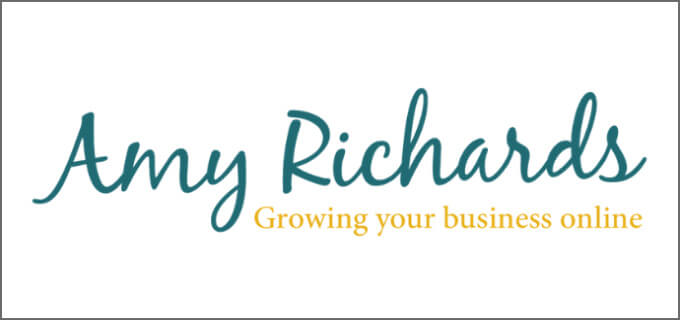This is a Virtual Assistant case study and interview with Amy Richards who trades under her own name of Amy Richards VA. With a background in the teaching profession, Amy now specialises in providing techie services to coaches and solopreneurs. She has been working as a VA since February 2015 and lives with her wife in Cardiff, Wales.
What did you do for a living before you became a VA?
I started out in web design, then taught English and Media in high schools for 12 years. I held various administrative roles in between – including working as a receptionist/admin in a community college while I was at uni, working for a national Government agency and managing an admin team for a charity that was going through a major expansion.
When did you first hear about VAs or became aware they even existed?
I actually can’t quite remember! I know that I started being one before I knew it was a thing – and thought I’d invented it. I think I may have come across the term for the first time in John Williams’ brilliant and inspiring book Screw Work, Let’s Play (highly recommended, especially if you’re on the verge of taking the plunge and working for yourself!).
I do remember Googling the term VA (this was actually quite a while after starting my business when I already had a couple of clients) and that was when I found Jo and the VA Handbook.
What was the trigger for you becoming a VA?
Long story! The short version is that I’d been off work for about six months with clinical depression and anxiety. When it came time for me to start my ‘phased return’ I set off for the school where I taught, got as far as the gates and just kept on driving!
I’d been thinking of going self-employed for a while, but it was that moment outside the school gates, facing a return to a life I hated, that was the final push I needed.
Did you just leave your job or start VA-ing gradually?
I knew I wanted to be self-employed, but I had no real idea what I would do. When I left teaching I had enough money saved for about four months – and no plan! My first client was my super supportive dad. Then someone he knew was looking for help and became my second client.
I wasn’t attracting much other work though, so I had to start supply teaching a couple of days a week for the first year and a half. I was starting to feel like that would never come to an end – but funnily enough, in the end, I just decided, “No more, I’ll find enough work somehow”, and I quit.
I didn’t renew my teaching council membership and cancelled with my supply agency. I joined a local networking group the same week and I’ve been paying the bills through my VA work ever since!
I think sometimes you need to take some decisive action to show the universe that you mean business.
When you do that, the universe seems to take you at your word and give you the opportunities you need. That’s been my experience anyway.
Where did you find the help or advice you needed when setting up?
When I first set up I got most of my advice from reading business books. I got loads of good ideas from reading Marianne Cantwell’s Free Range Humans. Then I found the VA Handbook, and most of the help and advice I’ve had since has come from Jo Munro and the other VAs in the Facebook group, who were (and are) all super-supportive and helpful.
I remember one lovely VA coming on a Skype call with me to practise because the thought of video conferencing terrified the life out of me! I now use Zoom with clients almost daily, so I find it funny that I was so nervous about it, but having someone to help me over that mental hurdle – with no derision or judgement – was priceless.
Who was your first client and how did you get them?
My dad was my first client. In fact, most of my early clients were people I knew: someone who used to be a deputy head at a school I’d taught at; a friend who was CEO of a local charity. I followed the advice in the books I was reading at the time to start with my own network, and it worked.
But things didn’t really take off until later when I did the unit on finding clients in the DIY course and started using LinkedIn and going to networking events.
Do you have a niche?
My clients are mostly life and business coaches, and the work I do for them is to support the online aspects of their businesses. I build email automations, manage email marketing platforms, create landing pages, build and manage WordPress websites and connect everything up so different systems talk to each other.
I also write and edit copy for blogs and websites and help write and build e-learning courses and memberships, including editing video and audio content.
How would you say you were different from other VAs?
I’d say first and foremost: I don’t do admin! What I love is being creative, and fiddling around behind the scenes, joining the dots and making things go. In terms of client base, most of my current clients are coaches and solopreneurs.
My ideal client is a business person with a solid career behind them who is launching an online coaching business and needs someone to implement their online marketing strategy and courses/memberships.
 What’s the best thing about being a VA?
What’s the best thing about being a VA?
FREEDOM! I really do feel that I freed myself. Every afternoon I walk through a park and along a river to meet my wife on her way home from work; I look around at the trees and the people walking their dogs and think “I could be stuck in a classroom or marking books right now”.
I feel in charge of my life – I get to do the things I love all day.
When I was teaching media studies I used to watch the kids on their computers and think that I’d far rather be doing what they were doing than watching them do it! Now I get to be creative on the computer myself.
What’s the hardest thing about being a VA?
Having to juggle lots of clients and tasks! It can be a challenge sometimes to manage everyone’s expectations, especially when retainer clients ask for more hours and I either have to work very long days or disappoint them.
I have started working with associates this year to alleviate some of that pressure, but my skillset is quite specific so often clients only want me.
How virtual are you?
I work exclusively from home. I have some health problems with my eyes and spine, so laptop screens are not my friend. I work with two big screens, as much natural light as I can find, an overhead daylight bulb and an ergonomic kneeling chair.
I occasionally meet clients in person, but usually have meetings using Zoom, or use Voxer for quick comms. I’ve got several clients I’ve not met at all – and one I’ve only ever spoken to on the phone!
How do you find your clients?
Quite a few on LinkedIn, and the rest through my network – including networking meetings, other events, business contacts, friends and family.
How do you manage your personal/work life balance?
Ha! Not very well. I’m married, but we’re childfree, so there’s not much to stop me working on when I’m engrossed in something. I do make myself go for a walk every day though.
My wife also runs her own business, so there’s a lot of shop talk in our house… I once read that people are either ‘pleasure machines’ or ‘purpose engines’, and I’m definitely a purpose engine.
How do you manage your clients, their work and their expectations?
I keep a note of how the hours for each client break down daily and try to keep to a rough schedule each day. Some clients have more urgent tasks than others, so I then prioritise according to need.
Afternoons tend to be given over to meatier tasks such as project work, so when I’m more tired I’ve got something to really engage me, where I can get into the flow and not notice time passing.
What technology, websites, or apps are invaluable to your working life?
Asana, Evernote, WordPress, Leadpages, Photoshop; VideoPad and Audacity (for video and audio editing). Did I mention Evernote? Best. Thing. Ever.
Would you do anything differently if you had to start again?
When my gut instinct was screaming at me to NOT take on the client, no matter how much money she was offering, I wish I had known to run away. I got burned once and I will NEVER ignore my gut again. If it feels wrong at the start, it’s not going to feel any better six months down the line.
What advice would you give to someone considering becoming a VA?
Have a contingency plan at the very start – some savings and/or work you can do part-time. People say to start a business in your spare time, but I didn’t have any as a full-time high school teacher! I prefer to look at it as finding work you can fit around your business, which is why I took on supply teaching as I was getting started.
Also, if you think you don’t have the right skills, look harder.
I honestly thought that after teaching for 12 years I wouldn’t be a good fit for any other kind of work – but it simply wasn’t true. I found I had loads of transferable skills and relevant experience.
Connect with Amy Richards on Facebook.
As with most of the other VA interviewees, Amy set up after completing my flagship DIY VA course. If you’d like step by step instructions on how to set up and run your own successful Virtual Assistant business you can read more about the course here.





This is really inspiring as I have left my teaching job after 16 years to start my VA business (like you, I was off with WRS and complete burnout for a few months before deciding enough was enough!) I only started my VA business 3 weeks ago, so it’s very early days but this gives me hope that my transferable skills from teaching are valuable!
Great interview!
I am struggling to read all the books recommended even though I have bought a few. It’s trying to find that 10 mins to read.
Ah, you have to MAKE the time, you see!
Wow! Great insights.
Thanks Elizabeth!